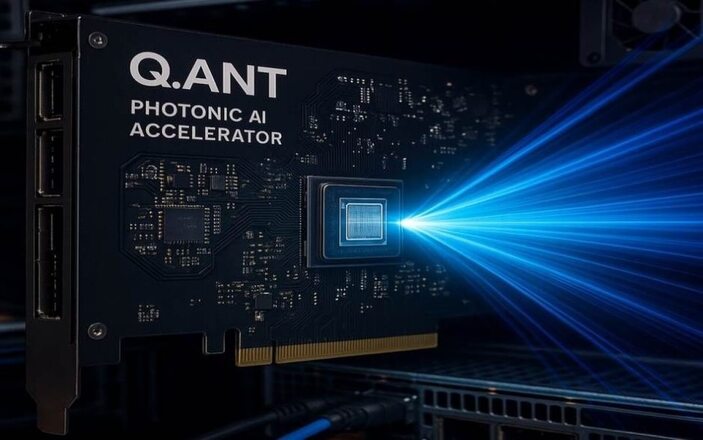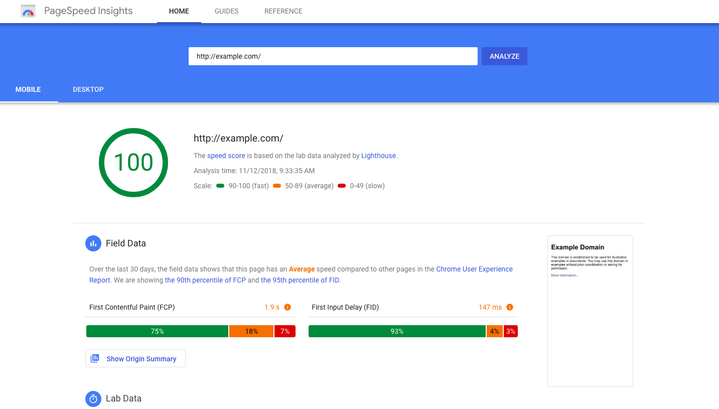
Q.ANT, a pioneer in photonic processing from Germany, has raised €62 million in a Series A funding round – probably marking the largest such investment in photonic computing in Europe to date. The financing is aimed at accelerating the commercialization of Q.ANT’s light-based processors, which promise transformative energy efficiency and performance benefits for artificial intelligence (AI) and high-performance computing (HPC) workloads.
As global demand for AI infrastructure continues to surge, traditional silicon-based chip technologies are reaching their physical and architectural limits. CMOS processors face growing challenges with power consumption, heat dissipation, and limited scaling potential. Q.ANT’s solution, which replaces electrical with photonic computing using light to process data, offers a fundamentally new approach that could dramatically reduce energy consumption while enabling significantly higher performance.
Founded in 2018 as a spin-off from German industrial firm TRUMPF, Q.ANT has rapidly progressed from research to real-world readiness. Its flagship product, the Photonic Native Processing Server (NPS), is designed to serve as a plug-in co-processor compatible with standard data center environments. Built on Thin-Film Lithium Niobate (TFLN), the NPS operates without active cooling and delivers gains such as up to 50 times greater performance, 30 times higher energy efficiency, and 100 times the compute density of conventional processors, according to internal tests.
This latest round of funding is co-led by Cherry Ventures, UVC Partners, and imec.xpand, with participation from L-Bank, Verve Ventures, Grazia Equity, EXF Alpha of Venionaire Capital, LEA Partners, Onsight Ventures, and TRUMPF. The investment will support Q.ANT’s global expansion, including scaling operations into the United States, growing its team, and further developing next-generation photonic processing technologies.
Data Center Sustainability
Q.ANT’s approach has attracted notable endorsements from both the business and academic communities. Industry veterans Hermann Hauser, founder of ARM, and Hermann Eul, former Intel executive and Infineon board member, have joined Q.ANT’s advisory board to help guide its scaling and commercialization efforts. Commenting on the company’s momentum, Cherry Ventures Founding Partner Christian Meermann said, “Q.ANT’s photonic chips are capable of dramatically reducing operating costs in data centers while unlocking new performance levels required by AI and HPC applications.”
With growing concerns over the sustainability of data centers – especially as AI workloads become more compute-intensive – Q.ANT is positioning itself as a crucial player in the emerging clean tech computing landscape. The International Energy Agency predicts that global data center electricity demand could surpass Japan’s total consumption by 2026. Against this backdrop, Q.ANT’s low-power photonic processors offer a compelling alternative to conventional silicon chips, which struggle with the escalating energy and cooling requirements of today’s AI workloads.
“Photonic computing has long been considered the holy grail for data-intensive applications,” said Cyril Vancura, Partner at imec.xpand. “Q.ANT has solved key technical challenges and is now uniquely placed to define the future of high-performance computing with a fundamentally new architecture.”
Dr. Michael Förtsch, founder and CEO of Q.ANT, emphasized the company’s broader mission to reinvent computing from the ground up. “We founded Q.ANT with the bold ambition of replacing electricity with light in computing. This investment confirms both the technical viability of our platform and Europe’s readiness to lead in this space,” he said.
Deployment in Commercial Data Centers
Early-access versions of the Q.ANT NPS are now available to select partners. The system is designed for easy integration into existing AI software stacks, supporting standard programming languages and infrastructure formats. This plug-and-play compatibility is critical for rapid deployment in commercial data centers.
Analysts have taken note of Q.ANT’s technical and commercial milestones. Bob Sorensen, Chief Analyst for Quantum Computing at Hyperion Research, highlighted the company’s ability to deliver analog computation with high precision, stating, “Q.ANT is proving that analog photonic computing can be accurate, scalable, and immediately applicable to real-world tasks like AI inference and scientific modeling.”
L-Bank Executive Board Member Johannes Heinloth pointed to Q.ANT’s role in strengthening regional innovation and competitiveness, describing it as “a driver of a new computing ecosystem” that combines industrial relevance with global scalability. Q.ANT’s success also underscores the growing appetite for deep tech investment across Europe.
According to TRUMPF CTO Berthold Schmidt, the photonics company is “well ahead of the curve,” combining high-impact technology with a robust go-to-market strategy. As Q.ANT prepares to scale globally, its photonic processors may soon power a new generation of AI and HPC systems, delivering on both performance and sustainability at a time when the tech industry urgently needs both.






